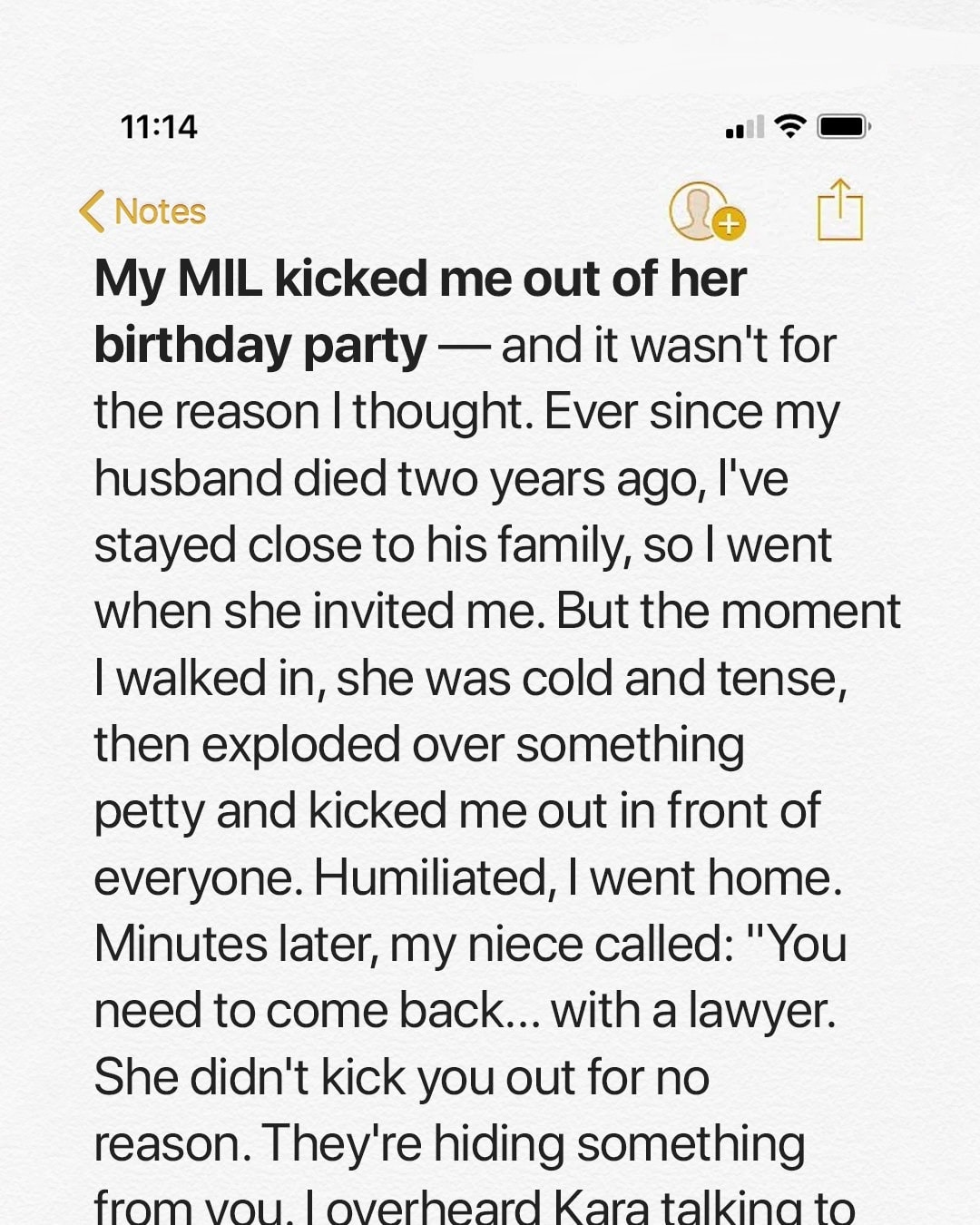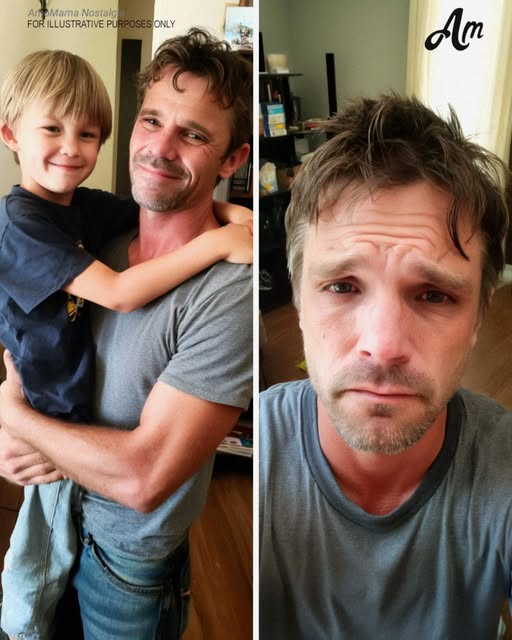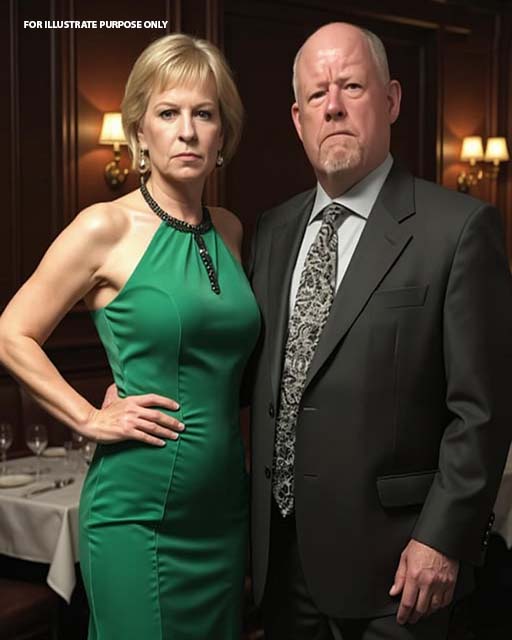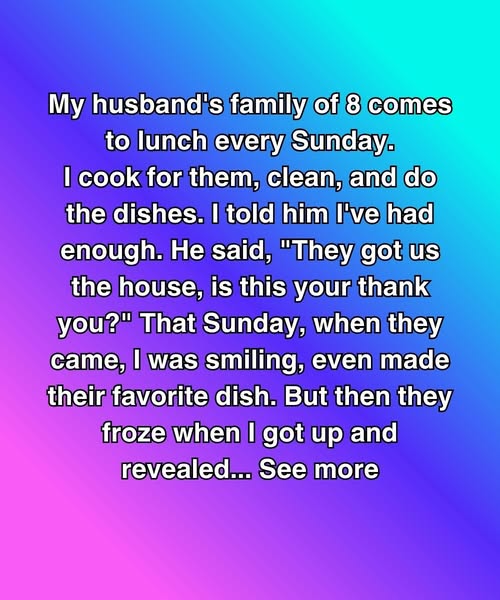I didn’t dress for a war that day. I dressed for a birthday—black slacks, Luca’s soft blue cardigan that still held his cologne, a lemon cake from the bakery he loved. Noreen had texted me the invite herself, with a heart and a “wouldn’t be the same without you.” Ever since Luca died two years ago, I’ve shown up for his family’s holidays, hospital runs, minor emergencies—because grief doesn’t unmake a family, it just rearranges the chairs. Or so I thought.
The moment I stepped into Noreen’s living room, the temperature dropped. Conversation hiccuped. Kara’s smile stalled half an inch from her eyes. Uncle Brent parked himself by the bar cart like a sentry in a suit. Noreen barely glanced at me when she took the cake.
“You came,” she said, voice tight as plastic wrap.
“I did,” I answered, choosing lightness. “Happy birthday.”
She carried the cake away without another word. I stood there with my coat in my hands and the feeling that I’d wandered onto the wrong stage mid-scene. A few cousins gave me quick one-armed hugs, then found other rooms to be in.
I set the gift on the table, stepped toward Noreen. “Is everything all right?”
She flinched, then snapped, “Maybe you should think before arriving late. We’ve already eaten.”
“I texted you—traffic on the 14—”
Her jaw jumped. “There’s always an excuse.”
The room went quiet so fast you could hear the fridge hum. I felt heat rise in my chest, then tamped it down. “I’m here now. I’ll just find a seat.”
“No,” she said, louder now. “You won’t.” She lifted her chin toward the door. “You need to go.”
My mouth opened. Closed. “I… What did I do?”
“Don’t make a scene,” she hissed. “You’re not family. Not anymore.”
That one landed. I looked at faces I had fed soup to, houses I had helped paint, babies I had rocked so their parents could sleep. Brent watched me the way a hawk watches a shiver of mouse grass. Kara’s thumbnail worried the label off a wine bottle.
“Okay,” I said finally. “Okay.” I slipped into my coat, left the cake like a hostage, and walked out without letting tears smudge my mascara. Humiliation, I’ve learned, is hot first—then it chills you to the bone.
I had barely set my keys on the kitchen counter when my phone buzzed. My niece, Tayla, her voice a fast whisper: “You need to come back… with a lawyer. They didn’t kick you out for no reason. They’re hiding something from you. I overheard Kara talking to… Uncle Brent. About selling off Luca’s land.”
Everything inside me went still. Luca’s 12 acres—his grandfather’s old pasture, the strip of creek lined with sycamore, the ridge where he’d once said, “Maybe a treehouse. Someday.” Developers had been sniffing around for months; a new interchange was coming, and anything green within five miles was suddenly “opportunity.”
“Say that again,” I whispered.
Tayla’s breath hitched. “I can’t on the phone. But I recorded part of it when I went to get more ice. I’ll send it.”
Fifteen minutes later, a file arrived. Muffled voices, a clink of glass, then Kara, clear enough to slice: “She won’t know. As long as we get her out of the house, Mom can sign on Luca’s behalf, and the deal closes Friday.”
“Mom” was Noreen. “Sign on Luca’s behalf” was a sentence from a nightmare—my husband was dead, and ghosts don’t sign deeds. I played it again. And again. The room grew small around me. I thought of the day after the funeral, when I had stood in this kitchen with a black folder of death certificates and casseroles lined on the counter like soldiers—how I’d said to Brent, “There’s the land, of course,” and how he had patted my shoulder and said, “We’ll take care of everything.”
I didn’t sleep. By morning, I had found the person who would.
Diya—my cousin’s wife—speaks estate law the way some people speak music. I sent her the audio and the parcel number. She called within an hour.
“Rhea,” she said gently, “we’re filing an injunction. Today.”
She explained what I should have known but didn’t think to learn because grief is a fog that steals your admin skills: without a will, Luca’s estate should have gone through probate. As his legal spouse and with no children, the default distribution was clear. The land was part of his estate and should transfer to me—cleanly, legally, in public record.
“It looks like no one filed probate at all,” she said. “Which means the title is still in his name. If anyone tries to convey it without court authority, that’s a problem—with handcuffs.”
I heard my own heartbeat. “They set me up to get me out of the way.”
She didn’t argue. “Forward me the recording and the assessor records. I’ll draft the temporary restraining order and lis pendens now.”
By afternoon, the paperwork was in motion: an injunction halting any sale, a notice recorded against the property alerting the world to the dispute. Diya’s paralegal messengered copies to Brent’s office and Noreen’s address. I didn’t drive over there with fireworks. I sat at my dining table, hands around a cooling mug, and let the relief come in slow, dizzy waves.
The next morning, my phone rang. Kara.
“You’re unbelievable,” she snapped. “Lawyers? Really?”
“I heard you,” I said. “On the recording. With Brent.”
Silence—a clean, sharp silence you could set a cup on.
“You don’t even want the land,” she said finally. “You just want to punish us.”
“It’s not about land,” I said, my voice steadier than my hands. “It’s about Luca’s wishes. And the fact that you tried to push me out of a birthday party so you could push me out of what’s already mine.”
She hung up. Two hours later, a letter arrived from their attorney arguing that “as ancestral property, the land remains within the bloodline.” Diya took a pen to it like a surgeon: “In this state, separate property inherited by a spouse remains separate property unless transmuted; on death without a will and no issue, the surviving spouse takes pursuant to intestate succession. Bloodline is not a legal category. See attached statutes.”
While the reply couriered, I got a Facebook message. Noreen. “Can we talk? Just you and me.”
My thumb hovered over “ignore,” then shifted. I needed to see her eyes when she said whatever she had to say.
We met at a café on Oak. The kind with chalkboard menus and too many succulents. She looked older than her last birthday—skin papery at the temples, hair thinned to a halo. She kept her purse on her lap like a shield.
“I didn’t know how to stop it,” she said without preamble, voice fraying. “Brent said it would be good for everyone. That you’d moved on. That you weren’t… invested.”
“I haven’t moved Luca’s shoes,” I said. “There’s dust on the dresser he used for cufflinks. But I’ve shown up—for this family. And you threw me out like I was an embarrassment to your table.”
She flinched. “I panicked,” she whispered. “He said if you found out, the deal would fall apart. I need the money. The house—my medical bills…”
My anger softened into something heavier. I believed the part about bills. I didn’t believe the part about powerlessness. “You could have asked,” I said. “We could have made a plan that didn’t require lying.”
Tears rimmed her eyes, clung, did not fall. She reached for my hand, thought better of it, reached for her tea instead. “I’m sorry,” she said, and in the corner of the café, a barista dropped a spoon and both of us flinched like it was a gavel.
The injunction held. Friday came with no sale. The lis pendens on the title kept any escrow from opening. Diya filed for probate, petitioned the court to appoint me personal representative, and cataloged assets that fit in a single page: joint checking, a truck, twelve acres of land. We published the required notice to creditors. No one objected on paper. In whispers and texts, that was another story.
Brent cornered me once in the grocery store by the pears. “You’re making this ugly,” he said, all genial-wolf smile. “It was going to help your mother-in-law. Help the family.”
“Families don’t steal from widows and call it help,” I said, selecting fruit with more care than the conversation deserved. “Also, you’re not my family anymore. You chose that.”
He reached for my cart, then thought better of it when the produce manager stepped up behind me like a quiet bouncer. “Have a good day, Brent,” the manager said. We both did.
Court took months because courts do. Paper shuffles at the pace of bureaucracy and grief. I learned to sit on wooden benches with people whose stories were different but the same: a sister contesting a will, a son asking to be executor, an ex-wife praying the judge would see through a forged signature. When our hearing was finally called, the judge read the file, asked two questions, and signed an order that put in ink what had already been true in the marrow: the land belonged to me.
Here’s where people expect a triumph: me fencing the property, posting a No Trespassing sign big enough to read from the moon. That’s not what happened.
Luca and I had walked that land a hundred times—through spring green and brown November, listening to frogs by the creek and the wind combing the field. He’d always stop at the ridge and say, “It’s good that this is still here. It makes everything else feel less… loud.” A year before he got sick, we’d read a pamphlet from the local conservation trust about easements and preserves and how farms get swallowed one cul-de-sac at a time. He’d circled a line—protect forever—and stuck it to the fridge with a magnet.
So after the court order recorded, I called the trust. I met them at the property with coffee and boots and a folder full of papers. We walked the fence line. We found deer tracks and a hawk feather and a sycamore that had seen more honest things than any of us. Their director talked about soils and species and corridors for wildlife. I talked about a man who wanted a treehouse.
Two weeks later, I signed the transfer. All twelve acres—no carve-outs, no strings—went to the trust. They would steward it for the community and the creek and the hawk. Developers could circle all they wanted. The deed was an unopenable door.
The local paper ran a small piece on page three: “Widow donates 12 acres to conservation.” There was a photo of me in a baseball cap, looking like someone who had finally set down a sack of rocks she’d carried too long.
Kara texted within the hour. “Wow. You gave away half a million dollars just to spite us?”
I stared at the screen, at her smallness shaped into a sentence, and let the wind outside my window answer for me.
Because she was wrong. I didn’t give it away to spite anyone. I gave it away to keep a promise—to a man, to a ridge, to a boundary between what can be bought and what must be guarded. Some inheritances aren’t money; they’re instructions.
In the quiet that followed, a few things became diamond-clear:
When someone shows you who they are—believe them. “Family” is a word you have to keep earning, not a badge that lets you cut lines. Paperwork isn’t cold; sometimes it’s how love protects itself when people won’t. And peace—surprising, clean, unspectacular peace—arrives not when you win the argument, but when you stop playing a rigged game and build something that will outlast the shouting.
I didn’t move away with a check. I stayed. I planted milkweed by the back fence to feed monarchs that will never know my name. I boxed up Luca’s shoes one afternoon and cried into an old flannel until the dog came and put her head on my knee. I sent Noreen a copy of the trust’s newsletter when the first school group visited the property to learn the names of trees. She didn’t respond. She didn’t have to.
On a clear Saturday, I drove out to the land one more time with a thermos of coffee and a small bench from our porch. I set the bench on the ridge where the treehouse will never be and sat as the wind combed the field. The creek murmured. A hawk wrote its quiet signature across the sky. I didn’t feel triumphant. I felt… aligned.
They tried to take something that was already mine. In the end, I gave it to the only thing big enough to hold it without trying to pocket the change.
I didn’t get the inheritance they tried to steal.
I got something better: clarity about who stands with me, closure that doesn’t ask for anyone else’s permission, and the kind of dignity you can sit on a bench with and share a thermos in silence.
If you’re fighting for what’s already yours, keep going. Call the lawyer. Save the receipts. Believe the recording in your pocket. And when you win—because you will—choose the ending that lets you breathe. Someone else may need to see that it’s possible.




